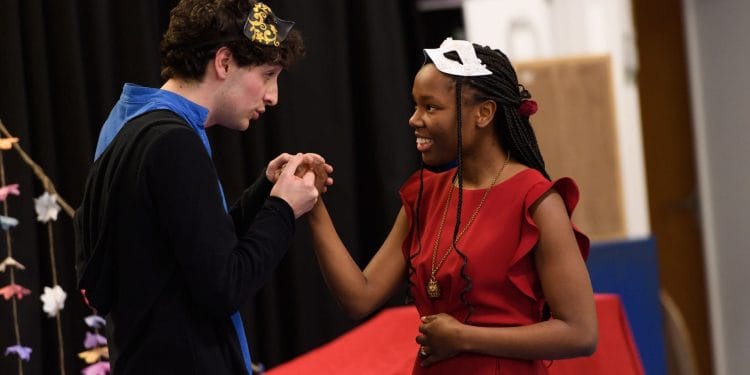The Royal Shakespeare Company will celebrate Shakespeare’s Birthday (23 April) in Skegness staging Romeo and Juliet in local schools and The Embassy Theatre. The performances are part of the new long-term partnership between the RSC, the area’s local leisure and culture trust, Magna Vitae and schools from the Greenwood Academies Trust.
James Brindle, Executive Director of Magna Vitae said: ‘This partnership will offer new perspectives on what young people here could only dream to achieve. It will be seismic social and educational change with the skills associated with the creative industries aligned to this coast for the first time’.
RSC partnerships use a combination of Shakespeare’s plays and teaching approaches inspired by the Company’s rehearsal room approaches to impact young people’s social, emotional and academic development, particularly their language development and confidence. The Company has 15 regional theatre partnerships involving 280 schools in areas of structural disadvantage across England.
The significant impact of this work is showcased through new RSC research, Time To Act, funded by Paul Hamlyn Foundation. This ground-breaking study provides evidence that teaching Shakespeare using RSC approaches improves children’s literacy, as well as fostering key life and work skills such as communication, problem-solving and critical thinking (see notes to editors).
The research findings have led the RSC to work alongside Arts & Culture Finance (part of Nesta) to pilot a new approach to funding arts education. The model is based around social impact measures, an approach not previously used in the performing arts sector. The model relies on donors committing to payments only if pre-agreed impact targets are met. If successful, the pilot could create new ways of funding the arts sector’s work.
The RSC’s performances in Skegness are part of the Company’s First Encounters with Shakespeare 12-week tour which visits schools and theatres around England, made possible by Arts Council England funding. The production is one of the many ways the RSC works with young people and teachers as part of its Associate Schools Programme.
The visit to Skegness coincides with the appointment of Geoff Barton to the RSC’s Board. A former English teacher and Chair of the new Oracy Commission, which aims to build a blueprint for a ‘national entitlement’ across all stages of education in England, he recently stepped down as General Secretary of The Association of School & College Leaders. Geoff will join RSC Chair, Shriti Vadera, at Skegness Junior Academy on Shakespeare’s Birthday for the performance, workshop and Q&A with students from the schools.
Geoff Barton said: ‘I am delighted to be joining the RSC Board. Arts learning has a significant impact on young people’s language development and confidence, and the RSC’s work in this field is pioneering. I couldn’t be prouder to join the Board as a critical friend and as advocate and ambassador for their amazing work in bringing Shakespeare to more young people and their communities in times where his stories feel ever more urgent and relevant’.
Shriti Vadera, RSC Chair added: ‘We are delighted to welcome Geoff to the RSC Board. He was inspired by a brilliant English teacher as a child, he was a teacher himself for over 3 decades and has championed the voice of thousands of school and college leaders over the last seven years as General Secretary of the Association of School and College Leaders. His knowledge, experience and passion will be a great asset to the RSC’s ground-breaking learning work with young people and teachers’.

















